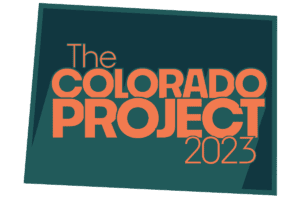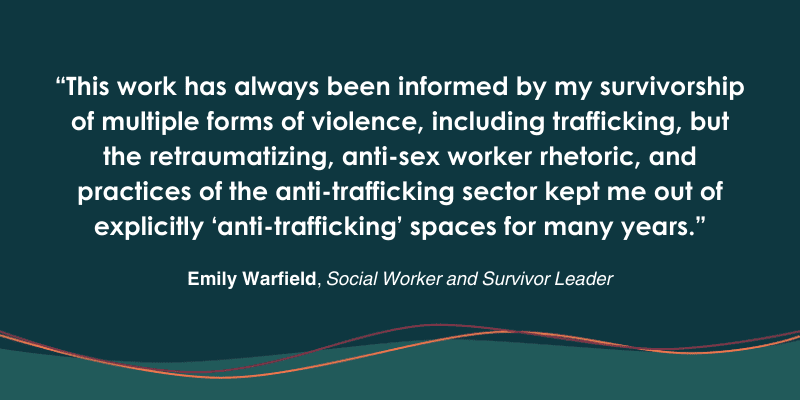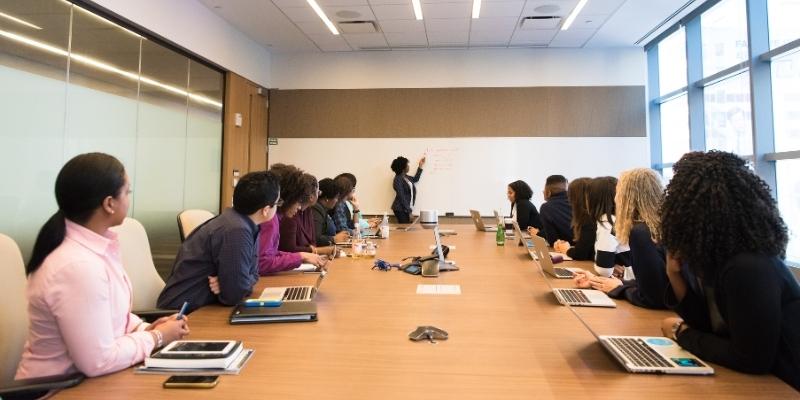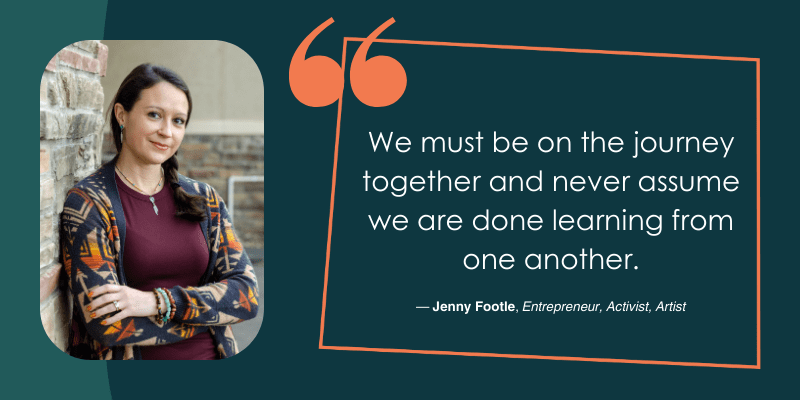 The following story is a part of a special series that highlights the release of the Laboratory to Combat Human Trafficking’s research report, The Colorado Project 2023. This series provides a platform for the diverse voices and partnerships working together to end human trafficking across our state. Discover why trust, equity, and effectiveness are critical elements of the anti-trafficking movement.
The following story is a part of a special series that highlights the release of the Laboratory to Combat Human Trafficking’s research report, The Colorado Project 2023. This series provides a platform for the diverse voices and partnerships working together to end human trafficking across our state. Discover why trust, equity, and effectiveness are critical elements of the anti-trafficking movement.
At the Laboratory to Combat Human Trafficking, we believe that anti-trafficking efforts must make every effort to incorporate the expertise of survivors into its work. Survivors have been a big part of the data design, collection, and analysis of The Colorado Project 2023, our latest research initiative on human trafficking in Colorado. But the anti-trafficking movement has room to grow when it comes to stepping aside for survivor leaders to step in.
We spoke with three survivors who now serve as leaders and experts of this human rights issue. Hear directly from them about what needs to change in Colorado’s anti-trafficking movement to better support survivors and incorporate their knowledge into the strategy, policy, and action of our state’s partnerships.

Survivor Leaders Are Critical in Anti-trafficking Work
Emily Warfield, a social worker and survivor leader, explains the complexities of anti-trafficking work: “There is no one approach to ending trafficking because trafficking encompasses scenarios of domestic violence, of familial child sexual abuse, of labor rights violations and workplace exploitation, of human smuggling, of gang violence, of survival behaviors of unhoused youth.” Because so many issues intersect with human trafficking, having a range of lived experiences and expertise is important.
Anastasia Lynge is a program coordinator for Verité, a civil society organization working to illuminate and remediate labor rights violations in global supply chains. She also provides specialty consultation to direct service providers, academic institutions, and nonprofits working with survivors of both labor and sex trafficking. Her expertise is in familial and state-facilitated forms of trafficking, and her work as a mental health clinician in community-based and group practice settings has connected her with survivors of complex trauma. Anastasia explains, “Due to the individualistic nature of trafficking experiences, a diverse array of perspectives is needed. This includes representation of a myriad of identities, forms of trafficking experienced, and including voices at the local, national, and international levels.”
Jenny Footle is an artist, activist, and entrepreneur in the anti-trafficking movement. She runs a nonprofit focusing on long-term support for survivor wellness and community. As part of the BIPOC and LGBTQ community, she uses her expertise, experience, and art to influence and inform decision-makers through participation in advisory councils, research, partnerships, panels, presentations, and community discussions. She also works as a researcher who approaches anti-trafficking efforts from a public health perspective.
“Not only does survivor leader involvement enrich the work, but it diminishes the divide between ‘us’ and ‘them’ and keeps bringing humanity back to the table,” Jenny says. “What would the breast cancer movement be without survivors supporting it at all levels, or the addiction recovery movement without overcomers as frontline workers, researchers, advocates, and supporters? They wouldn’t be half as strong, informed, or hopeful without survivor leaders. The same goes for the anti-trafficking movement.”

Why Survivors Have Been Hesitant to Join Anti-trafficking Partnerships
While these three survivor leaders want to be a part of anti-trafficking work, they explain why it has been so difficult for survivors to be a part of existing efforts. Often, the experience can be re-traumatizing for survivors.
Emily shares, “This work has always been informed by my survivorship of multiple forms of violence, including trafficking, but the retraumatizing, anti-sex worker rhetoric, and practices of the anti-trafficking sector kept me out of explicitly ‘anti-trafficking’ spaces for many years.”
For more than a decade, Emily has been involved in harm-reduction-focused sex worker organizing. Pursuing a Master’s in Social Work has helped her understand why and how to bring sex worker-survivor perspectives into the anti-trafficking sector. Her dual perspectives as both a survivor and a researcher give her a unique position to critique how traditional approaches to ending human trafficking fall short.
Emily explains, “Most anti-trafficking partnerships include a large percentage of people working in law enforcement, and their focus is often on prosecutions. Meanwhile, most trafficking survivors in the United States experienced criminalization as part of their trafficking experience and are likely to be from communities with their own experiences of police violence and legal discrimination, such as PoC, disabled people, and LGBTQ+ people. Most survivors do not desire prosecution.”
Survivors deserve to decide what happens after they escape a trafficking situation, whether or not that’s prosecution. They deserve a seat at the table, and they deserve to feel safe in anti-trafficking spaces.

Photo credit: Christina Morillo, Pexels
A Trauma-Informed Approach to Incorporating Survivors
Survivor leadership requires a trauma-informed approach with a strong emphasis on diversity, equity, and inclusion. As Jenny explains, “Survivor leaders often have significant historical and financial trauma, are from systematically oppressed groups, and are overcoming intense abuse of power.” With this in mind, partnerships must incorporate survivor leaders into their work with great care in their approach.
One example is how organizations can be mindful of how they use survivors for their stories as a way of illuminating different kinds of trafficking experiences. “One of the biggest misconceptions I have run into surrounds the role of storytelling,” explains Anastasia. “While there are survivor leaders who are incredibly skilled at using their story within their work, this is not the case for every survivor of trafficking. Storytelling can often feel retraumatizing.”
Jenny echoes this warning of using survivors only as examples of trafficking experiences. “Thinking we can ‘hear from survivors’ and move forward without engaging them again is akin to using them for someone else’s gain and discarding them, adding to their trauma and distrust of people who want to help.”

Photo credit: Clay Bank, Unsplash
Diversifying the Narrative of Human Trafficking
We asked these three leaders for their recommendations of how anti-trafficking partnerships can work together more effectively with survivors. One recurring directive is the importance of breaking down the perceived hierarchy of human trafficking survivors.
Emily explains, “[A common misconception is that] there is an objective hierarchy of ‘worst’ kinds of trafficking, with minor sex trafficking being the very worst and usually conjuring up images of prepubescent children kidnapped by strangers, rather than the more common reality of older teenagers trading sex on their own for survival.”
Anastasia adds, “Policy debates can reinforce the hierarchy of survivors that have been prevalent within the larger anti-trafficking movement. This pattern can become familiar for those of us who hold sex trafficking experiences, as white, cisgender female survivors of domestic minor sex trafficking have often been given the upper hand in the sector. Survivors with different experiences and identities have been cast out of the space, especially survivors of labor trafficking, survivors of color, and LGBTQIA2S+ survivors. It is always wise to be mindful of positionality, experience, and the intersections of identity when engaging lived experience.”
She continues, “It is incredibly important to have equal representation of both labor and sex trafficking in all levels of programming, including the lived experience you are engaging with. For too long, survivors of labor trafficking have been forced to the margins in the sector, despite the fact that labor trafficking is the most prevalent form of trafficking here in the United States.”

Survivors as Leading Partners for Change
Anastasia, Emily, and Jenny agree that it will take a diverse community of changemakers willing to take bold action to end human trafficking. “Being in a community with other survivor leaders has given me a space to put my values into action,” says Anastasia. “It was through this training and leadership development that I became engaged with LCHT as a consultant a year ago.”
She continues, “Having the support of both survivor-led and allied organizations together forms the basis for a more cohesive movement. In these spaces, I feel like I can bring my skills and expertise to the table while also working collaboratively with other survivors who have expertise that I can learn from. Survivor leadership is not a stop-gap, but should be a lasting, and leading, partnership for change.”
Jenny says, “We must be on the journey together and never assume we are done learning from one another.” Emily concludes, “Ending a problem as enormous as trafficking will require that we be just as big and brave in our thinking that we are willing to interrogate and disrupt entire systems.” By listening to the expertise of survivors and putting their voices at the forefront of our efforts, we can end human trafficking together.
The Colorado Project is a community-based, research-focused approach to ending human trafficking in Colorado. Led by the nonprofit the Laboratory to Combat Human Trafficking (LCHT), The Colorado Project began in 2010 as a rigorous grassroots research project that helps us uncover what human trafficking looks like in Colorado, what has been done in the past to address it, and what we can do in the future to end it. LCHT released the third iteration of The Colorado Project results in October, 2023. This time, The Colorado Project 2023 revealed that cross-sector partnerships, staff training in key sectors such as healthcare and education, and addressing housing insecurity are key to ending human trafficking in Colorado.

